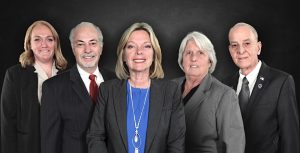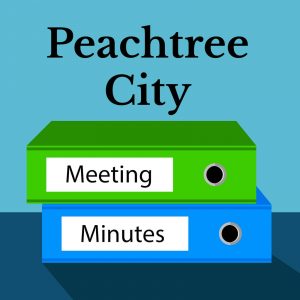The first of several Peachtree City Council retreats was held March 6. The initial meeting approached Peachtree City’s future from a global perspective, centering on broad economic development issues, macro-master planning and, to a lesser extent, future annexation.
Above, Peachtree City Manager Jon Rorie at the March 6 retreat. Photo/Ben Nelms.
At its essence, the meeting presented a number of future-oriented items with a broad-brush approach, one intended to lay the groundwork for future considerations.
City Manager Jon Rorie said upcoming retreat meetings will be the time to zero-in on specific issues as directed by council members.
The sparsely-attended meeting began with those in attendance hearing Rorie begin, as he customarily does, by stating that the city’s goal is to provide high-quality services to Peachtree City residents.
“No matter what we do, the things we do have consequences,” Rorie said. “Like pebbles in water, those ripples have an impact.”
Rorie continued, setting the stage for data explaining, regardless of the position of many holding the idea that the city is situated in an unpenetrable bubble, that view does not coincide with local and regional reality.
Rorie commented on Peachtree City as it is geographically-positioned in Fayette County and in southwest metro Atlanta. He noted that Fayette County’s population totaling 111,000 in 2015 is expected to increase to 143,000 in 2040. Similarly, Coweta County’s 2015 population of 141,000 will expected to increase to 240,000 by 2040, according to the Atlanta Regional Commission.
When it comes to the 20-county metro Atlanta area, which includes Fayette and Coweta, the 2015 population of 5.59 million is expected to increase to 8 million in 2040.
The coming increases in population will be accompanied by resulting increases in economic development and traffic.
Even today, employment and traffic patterns provide a glimpse of what Peachtree City’s future might look like. Current data provided by the Ga. Highway 74 Gateway Coalition showed the city with 15,500 residents leaving Peachtree City to go to work, with the vast majority of those traveling north and northeast. Meantime, 16,600 people travel to Peachtree City to work, coming from the north and northeast, but also from the east, southeast and west. As for city residents who work and live in Peachtree City, the number was only 2,600, said Hwy. 74 Gateway Coalition representative Richard Fangmann.
Commenting on population and employment along the Hwy. 74 corridor from Fairburn through Peachtree City, Fangmann said the corridor population in 2015 was 60,000, and with corridor employment at 30,000. The projection for 2040 shows a corridor population of 72,000 and with corridor employment at 41,000.
Fangmann noted a number of intersection improvements that could make travel more manageable in the future. He cited the “Continuous Green T” intersection on Hwy. 54 West in Peachtree City and the “Restricted Crossing U-turn” on Hwy. 74 in Tyrone as examples.
Those and other data points tended to drive home Rorie’s earlier statement that Peachtree City is positioned in the center of significant growth areas that include Fayetteville, Senoia, Coweta County and Tyrone and points north.
“Where are they (the areas surrounding Peachtree City) going to live, work and play? Will we be a sphere of influence or will we be in the bullseye?” Rorie asked, and adding that many people have diverging opinions about how roadways and traffic should be handled. “Any changes will be unpopular with some, but we have to think about the future.”

Noting some of the issues at play, Fayette County Planning and Zoning Director Pete Frisina referenced population projections and responded to questions about future development along the Ga. Highway 54 corridor between Peachtree City and Fayetteville.
Frisina suggested that the cities and the county work together in mapping out future plans for the corridor. Some single-family homes along Hwy. 54 have now become office space, while the developments adjacent to Peachtree City are situated inside the city on the north side and in the unincorporated county on the south side.
Also at the meeting, Fayette County Development Authority Business Retention and Expansion Project Manager Megan Baker spoke on economic development as the creation of jobs and wealth, and the improvement of the quality of life of a community.
Businesses provide an opportunity for people to live and work in the same community, add income for individuals, strengthen the tax base and balance the community’s tax digest, said Baker.
“We need a balance of commercial and industrial so residents don’t have to bear the burden,” she said, adding that 70 percent of Fayette’s tax digest is residential, with 18 percent commercial and 6 percent industrial.
Baker reiterated that economic development is a process, not an event.
“We like to say we live in a bubble, but we don’t,” said Baker. “Every community is vying for the big (economic development) prize.”
Another speaker at the meeting was city Senior Planner Robin Cailloux, who commented on the 2016 Citizen Satisfaction Survey that dealt with the planning focus for the next 20 years. More than 68 percent of citizens said traffic congestion needed to be addressed, followed by 48 percent signaling affordable taxes, 47 percent saying crime needs to be a main focus, 44 percent saying high-paying jobs needed attention and 42 percent suggesting that the city’s deteriorating infrastructure must be addressed.
As noted when Baker spoke, Caillioux referenced the need to maintain a diversified local economy, establish appropriate land uses, continually provide adequate levels of service and establish and maintain a comprehensive traffic system that provides safe and convenient circulation through the city.
Rounding out the meeting, though with only a small amount of time dedicated to it, was a presentation on potential annexation, with Rorie asking if the city should maintain the status quo, or expand to include urban fringe properties one at a time, and establish natural growth boundaries and potential annexation areas to enhance long-range planning.

The information Rorie provided was essentially identical to the annexation study nearly a half-decade ago. Among the areas noted at the time were the some of the study areas east of the city along Hwy. 54, south of the city at Hwy. 74 and Ga. Highway 85, along Dogwood Trail on the north and an area of unincorporated county situated on the northwest side between Peachtree City and Tyrone.
A new area, one for which some residents have inquired, is the Fischer Crossing area just west of the city in Coweta County, Rorie said.
Rorie offered a number of pros and cons dealing with annexation. But in the end, he said, “Annexation is one of the factors we have to look at to continue to provide high-quality services. We need a strategy for balancing what is desired and what is possible.”
With a glance at future trends, Rorie said the city will be seeing an increase in mixed-use proposals, along with those for assisted living facilities. Both these land uses are trending, both locally and nationally.
Rounding out his comments on potential annexation, Rorie said, “If we annex, we annex for a cause, not because.”
The council will hold another retreat session on April 3. The agenda will center on council focus topics, with Rorie asking for feedback on what topics should be discussed.












Leave a Comment
You must be logged in to post a comment.